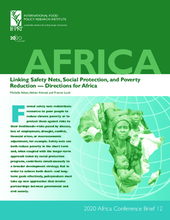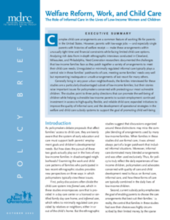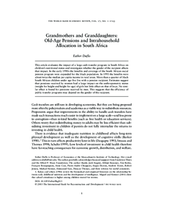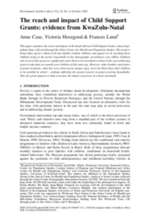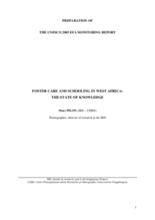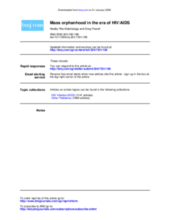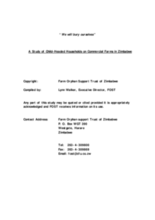Displaying 481 - 490 of 498
Outlines key findings of survey conducted to investigate the challenges faced by households caring for OVC in South Africa. Conclusion delineates six potential responses to community needs.
A short discussion of various safety net program options and considerations for effective program design. Focus on reducing poverty in sub-Saharan Africa
This document is the official policy governing National Orphans and OVC of the Ministry of Gender, Labour and Social Development (MGLSD) of the Republic of Uganda. The policy interprets a vision of a society where all orphans and other vulnerable children live to their full potential, where their rights and aspirations are fulfilled.
Research on the incidence, living arrangements, and causes of lower school enrollment of orphans in Sub-Saharan Africa.
Analyzing rich data from in-depth ethnographic interviews conducted in Cleveland, Milwaukee, and Philadelphia, Next Generation researchers documented the challenges that low-income families face as they patch together a variety of arrangements to meet their child care needs.
This research paper discussed the impact of the South African old-age pension program, or cash transfer, on the health of children living with an eligible recipient. It finds that both gender of the recipient and gender of the child living with the recipient are factors in health outcomes.
This research paper evaluates the impact of the Child Support Grant in South Africa. It finds that while there exists a strong commitment to implementation, the presence of a child’s mother is an important factor in program participation.
Explores the relationship between fostering and education in West Africa. Identifies special need to focus on protecting and educating young girls.
A brief editorial which argues that only by addressing the fundamental causes of the HIV/AIDS epidemic, such as poverty and social exclusion, will a sustainable solution be achieved. Support for extended families and education for children affected by HIV/AIDS are needed to respond the crisis, as well as a larger scale effort to transfer resources, strengthen economies and secure investments throughout Africa.
A report of an action research study done by Farm Orphan Support Trust of Zimbabwe (FOST), to learn about the problems of child-headed households on commercial farms in Mashonaland Central and Manicaland provinces. The report includes the problems indentified and some recommendations for interventions, such as integration of psycho-social support and provision of material needs.


